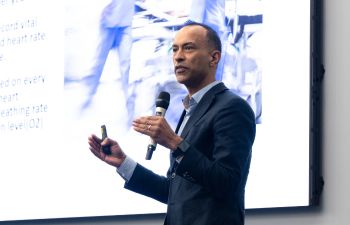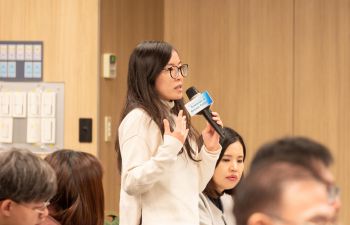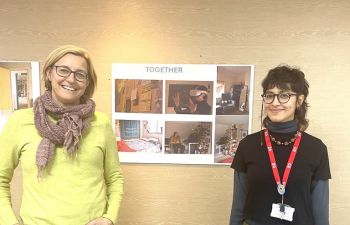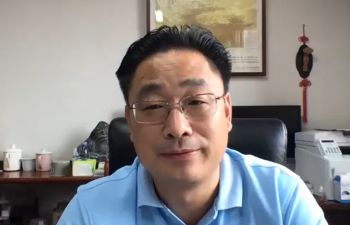Current Highlights
The Afterlives of Urban Muslim Asia: Alternative Imaginaries of Society and Polity
In the context of upheaval in Muslim Asia, studies of the region's urban centres and migrant communities can offer critical insights into identities that transcend sectarian and national identity and enable greater sensitivity in heritage preservation.
SAC 2021 Research Seminar Series
Join us for our weekly seminar series, Wednesdays 13:00-14:30.
Pilgrimonics
Pilgrimage is influenced by a complex of religious, socio-cultural, political and economic factors. This research project provides an original and systematic analyses of global pilgrimage across different sites.
Trust, Global Traders and Commodities in a Chinese International City
Professor Magnus Marsden leads this multi-sited and interdisciplinary research project centred on the Chinese city of Yiwu, engaging researchers and theoretical approaches in anthropology, area studies, business studies, and history and drawing on expertise from law, commercial shipping, and international trade policy.
Inter-Asian Dynamics Research Network
Professor Magnus Marsden leads a new network exploring the nature of connections, comparisons and circulations across multiple Asian settings.
Narrating Blood
Professor Maya Unnithan, director of the Centre for Cultures, Reproduction, Technologies and Health (CORTH), is building an international network for cross-cultural research and intervention into blood-related reproductive and adolescent health and care-economies in India, Bangladesh, Ghana and the UK.
Environmental History of South Asia
Professor Vinita Damodaran uses historical records to understand climate change in the Indian Ocean World.
Woman's Leadership in the Asian Century
Professor Louise Morley, Director of the Centre of Higher Education and Equity Research, explores women and academic leadership in Asia.
Spring - Summer '25 Events
Further information on upcoming seminars are below
6th February 1 - 2:30pm, Moritz Cheung (Platform Asia, Brighton) will deliver a talk on ‘An introduction to the work of Platform Asia’
Location: GSRC, Arts C
13th February 1 - 2:30pm, Luke Heslop (Brunel) will deliver a talk on ‘For Biriyani, it’s the Uxbridge Road: “authenticity”, origin stories, and podcasting in West London’
Location: GSRC, Arts C
27th February 1 - 2:30pm, Tom Chambers (Oxford Brookes) will deliver a talk on ‘“Sticky Money”: Debt/Credit in an Indian Woodworking Custer’
Location: GSRC, Arts C
6th March 1 - 2:30pm, Diana Ibanez Tirado (Global Studies) delivers a talk on ‘A “Second Chance”: Mexican soap operas, personhood and old men’s masculinities in southern Tajikistan’
Location: GSRC, Arts C
11th March, all day, the Asia Centre’s Annual Lecture (featuring Madeleine Reeves as Keynote) and PhD workshop
Location: GSRC, Arts C
20th March 1 - 2:30pm, David Henig (Utrecht University) will deliver a talk on ‘Elemental Infrapolitics: On Guerrilla Demining in a Landscape of War’
Location: GSRC, Arts C
12th May 1 - 2:30pm, Annual Lecture with Madeleine Reeves (Professor in the anthropology of migration, University of Oxford). Madeleine will be delivering her lecture on 'Squatting socialism: land claims, homelessness, and the politics of shelter in late Soviet Kyrgyzstan'
Location: C333, Arts C
Spring 2025 PhD Workshop
11th March, 9am - 5.30pm
The Asia Centre held its annual PhD workshop in Sussex on 11th March 2025. The 9th such event, the workshop was opened by Professor Robin Banerjee, Pro-Vice Chancellor for Global and Civic Engagement at the University of Sussex. Professor Banerjee recounted how he had come to study in Sussex having been educated in Asia and emphasised the important role that doctoral researcher say in the international connections of the University. Over the course of the day, researchers presented 15 papers in four panels addressing the following themes: The Worlds of Work Labour & Markets; Politics, Resources & Infrastructures; Selfhood, Identity & Belonging; and Healing & Rights-Based Communities. Attendees were treated to papers on topics as diverse and fascinating as suit fetishism in China, the lives of Pakistan-Hindu migrants in India, and the experiences of displaced Syrians in Lebanon.
Magnus Marsden
Director of the Sussex Asia Centre
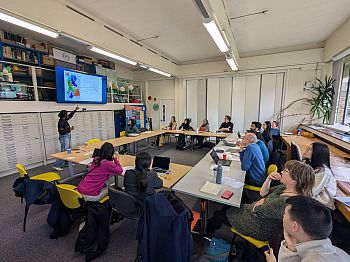
Previous Events
5th November 2024, 5 - 6.30 pm, the Sussex Asia Centre welcomes Dr Uday Candra, Assistant Professor of Government at George Town University, as they join us to talk about their book Resistance as Negotiation: Making States and Tribes in the Margins of Modern India. The event takes place in the Resource Centre room, Arts C and over Zoom.
"Tribes" appear worldwide today as vestiges of a pre-modern past at odds with the workings of modern states. Acts of resistance and rebellion by groups designated as "tribal" have fascinated as well as perplexed administrators and scholars in South Asia and beyond. Tribal resistance and rebellion are held to be tragic yet heroic political acts by "subaltern" groups confronting omnipotent states. By contrast, this book draws on fifteen years of archival and ethnographic research to argue that statemaking is intertwined inextricably with the politics of tribal resistance in the margins of modern India. The author demonstrates how the modern Indian state and its tribal or adivasi subjects have made and remade each other throughout the colonial and postcolonial eras, historical processes of modern statemaking shaping and being shaped by myriad forms of resistance by tribal subjects. Accordingly, tribal resistance, whether peaceful or violent, is better understood vis-à-vis negotiations with the modern state, rather than its negation, over the past two centuries. How certain people and places came to be seen as "tribal" in modern India is, therefore, tied intimately to how "tribal" subjects remade their customs and community in the course of negotiations with colonial and postcolonial states. Ultimately, the empirical material unearthed in this book requires rethinking and rewriting the political history of modern India from its "tribal" margins.
Uday Chandra is an Assistant Professor of Government at Georgetown University, Qatar. He received his B.A. in economics from Grinnell College and his PhD in political science from Yale University in 2013. He received the 2013 Sardar Patel Award for writing the best dissertation in a US university on any aspect of modern South Asia. Before coming to Doha, he held a prestigious research fellowship at the Max Planck Institute for the Study of Religious and Ethnic Diversity in Goettingen, Germany. Uday's research lies at the intersection between critical agrarian studies, political anthropology, postcolonial theory, and South Asian studies. His research has focused on caste, tribe, and the state in modern India as well as indigeneity and mobility in a broader comparative postcolonial canvas. Uday's work has been published in the Law & Society Review, Social Movement Studies, New Political Science, Critical Sociology, The Journal of Contemporary Asia, Contemporary South Asia, The Indian Economic & Social History Review, and Modern Asian Studies. He has co-edited volumes and journal issues on self-making in modern South Asia, subaltern politics and the state in modern India, caste relations in eastern India, social movements across rural India today, and transnational circularities across the Indian Ocean.
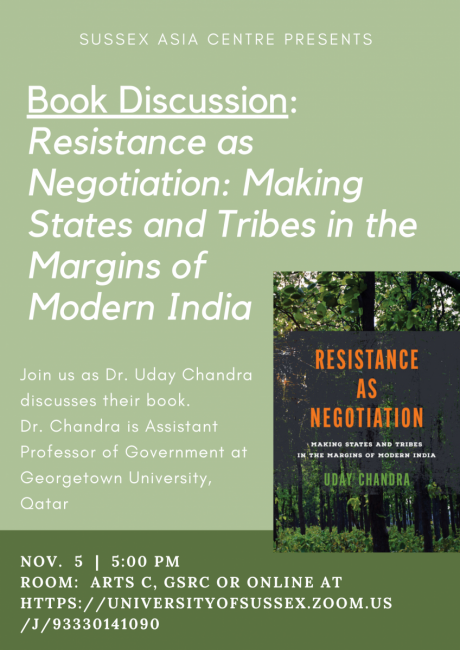
8th November 2024, 1 - 2.30 pm, the Sussex Asia Centre welcomes Philippa Williams, Professor of Geography at Queen Mary University of London. Professor Williams will bedelivering a seminar on 'WhatsApp, India and the geopolitics of digital privacy.' The seminar will take place in room C333, Arts C.
15th November 2024, 1 - 2.30 pm, the Sussex Asia Centre's own Magnus Marsden will be delivering a seminar on 'This crazy but completely fascinating business’: the Hudson’s Bay Company, the Cold War, and the Persian Lamb (karakul) trade, 1923 - 1970.'
Magnus is a Professor of Social Anthropology at the University of Sussex and Director of the Sussex Asia Centre. The seminar takes place in room C333, Arts C.
22nd November 2024, 1 - 2.30 pm, a special event co-organised between the Sussex Asia Centre and the Centre for Global Insecurities [Research] will feature Avinash Paliwal, SOAS, talking about their book India’s Near East: A New History. The seminar takes place in room C333, Arts C.
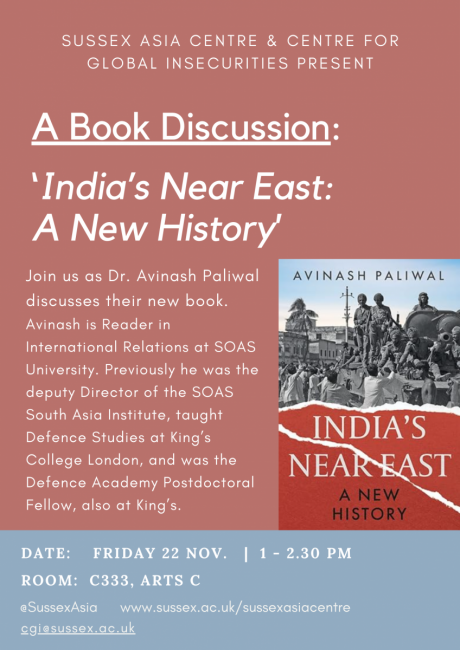
22nd October 2024, Dr. Garima Jaju visited the Sussex Asia Centre to deliver a seminar on 'Isha’s Wait: money, love, and kinship in the wake of domestic violence in India.' Dr. Jaju is a Smuts Research Fellow at the Centre of South Asian Studies, University of Cambridge.
Abstract: Isha waits in her low-income parent’s home for her estranged husband, charged for dowry and domestic violence, to pay her the legally mandated ‘maintenance money’. I listen to her as she talks about pyaar, or love, and domestic violence as arising from the absence of its ehsaas, or feeling/realization, by the abusive husband. The awaited money is infused with the hopeful imagination that it will generate both pyaar and its ehsaas. I argue that money becomes a substance of kinship that is assigned an agentive role in engendering the ethical transformation of a ‘bad’ husband to create ‘good’ kinship. Exploring the ways in which the tenuous legal promise of money sustains imaginations of reformed kinship futures, I outline how centrally money shapes the experience of domestic violence and the dealing of its aftermath.
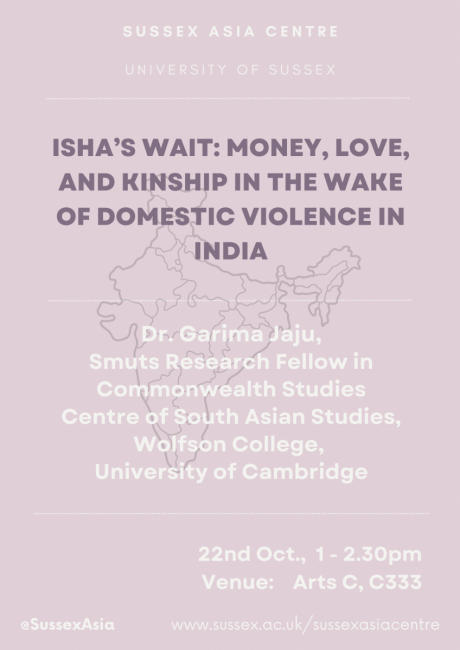
October 11th 2024, the Sussex Asia Centre welcomed Ammara Maqsood, from University College London, for a seminar on 'The place of difference: reflections on the possibilities of Hindu-Muslim friendships in Karachi.’
Abstract: Difference is often erased to engender togetherness, yet sometimes it is central to how people get along. I consider the place and value of difference in encounters between young Hindu and Muslim men and women in Karachi. Focusing on upwardly mobile settings, where many of my interlocuters have migrated from smaller towns in Sindh to Karachi for education and employment, I illustrate how friendships across religious divides depend on the maintenance rather than the closure of difference. Developing out of a mixture of practicality, need and personal inclinations, these friendships and alliances help navigating the new-ness of a large city. Aware of their position as a vulnerable religious minority and (rightfully) fearful that any hostile encounter could transform into a blasphemy charge, my Hindu interlocuters often depend on the protection of their Muslim friends but worry about being engulfed if they become too close. Inter-religious encounters open a ‘space of mediation’, where difference is both recognised and remembered, but overcome (briefly) as people explore new potentialities.
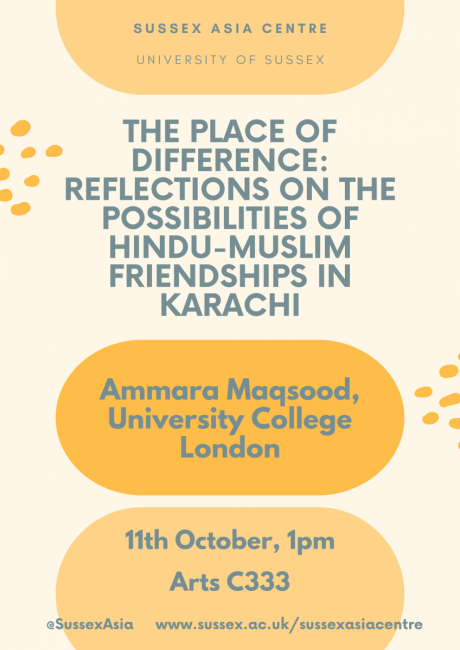
May 14th 2024 was the Asia Centre's Annual Lecture, delivered by Dr Omar Kasmani (Freie Universität, Berlin) on “Queer Companions: A Suhbet on Intimacy,” Chaired Prof Magnus Marsden (Anthropology, Director of the Sussex Asia Centre). The lecture took place in the morning and was followed by the PhD Workshop. The workshop’s central aim was to promote the study of Asia and to provide a supportive environment for doctoral researchers working on or in Asian settings / communities to present their work and benefit from the insights of researchers and faculty members at Sussex. The workshop was followed by a Reception in Dhaba cafe.
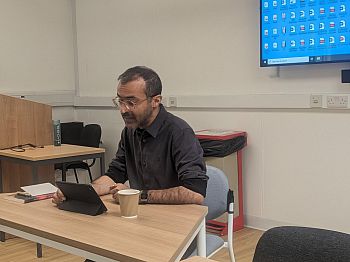
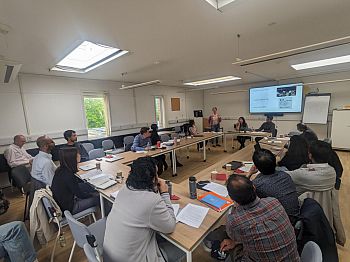

1st May 2024, Prof. Gao Fei of Jiangsu Normal University delivered a lecture on 'The Comparative Landscape and Major Trends of China's Short Video Market.' The lecture was co-sponsored by Global Law and Policy (LPS).
Gao Fei is professor at the School of Media, Film and Television at Jiangsu Normal University, senior editor at Beijing TV Station, and visiting scholar at the University of Westminster, and has been recognized as “China’s Top 100 Theoretical Talents in Broadcasting, Film and Television”. She previously worked as a presenter, journalist and editor at Dalian TV Station and later served as a chief editor at Beijing TV Station. She has more than 20 years of practical and theoretical research experience in the media field. Her research focuses on audio-visual communication and international communication. She has published over 80 academic papers in the fields of journalism and communication and has authored several monographs. She has presided over one subproject of a Major Project funded by the National Social Science Fund and two Ministerial-level Social Science Research Projects funded by the National Radio and Television Administration.
The lecture was Chaired by Dr Qingxiu Bu, Chair for the Programme in Global Law and Policy (PGLP) School of Law, Politics and Sociology.

On 20th March 2024, Michiel Baas from the Max Planck Institute joined the Asia Centre and Anthropology Dept. to deliver a talk about 'Living and Creating with AI in India'
Indian artists are increasingly incorporating artificial intelligence (AI) into their creative works. While their output shows the potential uses of AI for art, it also underscores its limitations and engages with common assumptions about what AI is. Drawing attention to the implications of AI for daily lives and its reliance on vast amounts of energy, their works point at the presence of AI as part of people’s lifeworlds and the way we share a planet with it. Taking a multispecies approach this article builds on extensive research among Indian artists and data scientists to propose a possible anthropological approach that centers on notions of cocreation and cohabitation with AI.
Michiel Baas is a Senior Research Fellow with the Max Planck Institute for Social Anthropology (Halle, Germany). His most research book is Muscular India: Masculinity, Mobility and the New Middle Class (Context, 2020). He has published extensively on migration and transnationalism; gender, sexuality and the body; and is currently working on an anthropological approach to artificial intelligence (AI). Previously he was with the Asia Research of the National University of Singapore; Nalanda University (Delhi/Rajgir); and the International Institute for Asian Studies (IIAS, Leiden). He holds a PhD in Anthropology from the University of Amsterdam.
On the 14th March 2024, Dr. Heila Sha visited the Asia Centre to deliver a talk on 'Working for laowai: trade, gender, employment, and social status'
Over the past three decades, Yiwu has attracted thousands of foreign traders, mainly from the Middle-east, Africa, South Asia and Latin-America, to live and trade in the city. Despite a boom in research into the migration experience of these traders, we know little about their interactions with Chinese (both locals and incoming) or what the foreign presence means to Chinese people in the city. Drawing on long-term ethnographic research into the lived experience of Chinese internal migrant women who are employed by foreign business owners in restaurants, trade agencies, and domestic spaces, I demonstrate how the nature of employment creates hierarchies and inequalities in social status not just between foreign employers and Chinese employees but among Chinese migrant women as well. I show how these hierarchies are associated with intertwining aspects of age, gender, cultural difference, social relationships, types of work, migrant status and senses of (in)security. I also show how these women may experience upward social mobility – through peer support and transnational marriage – and downward mobility, often related to the risks of international trade and the business cycle within transnational companies. In so doing, the paper contributes to theoretical reflection on migration, gender, employment, and inequality.
Dr. Heila Sha (Saheira Haliel) is a Research Fellow in the Centre for Research in Ethnic Minority Entrepreneurship (CREME) at Aston University. Her research expertise includes migration, cross-border trade, ethnic minority/migrant entrepreneurship, kinship, gender, marriage, family business, and socio-economic transformations in China. Saheira completed her Ph.D at Max-Planck Institute for Social Anthropology in Germany in July 2015. Her Ph.D research focused on inter-generational transformations of family life, care, and gender relations in response to socio-economic transformations in Northwest China. In April 2016, she joined University of Sussex (UK) as a postdoctoral Research Fellow, where her research explored transnational lives, mobilities and networks by applying multi-sited methodologies that bridge scales to connect globally diverse localities within transnational trading networks and commodity markets in the context of global trade liberalization. After Sussex, Saheira was a Research Fellow at Coventry University, where she worked with Migration for Development and Equality ( MIDEQ) hub, with a particular focus on migration intermediaries and inequalities.

29th February 2024, the Asia Centre welcomed Dr. Nick Long from LSE for a talk about 'Modern Sorcerers: The Cultural Politics of Hypnotherapy in Contemporary Indonesia'
Hypnotherapy is becoming increasingly popular in contemporary Indonesia as a means of improving one’s mental health as well as securing assistance for a variety of other personal and medical issues. However, the inherent ambiguity of hypnotic phenomena, coupled with longstanding schisms in Indonesian cultural politics, have led to profound disagreements over how the therapy should be understood. Some of its advocates see hypnotherapy as a means of not only treating specific issues but also moving public consciousness away from sorcerous and supernatural forms of ‘traditional healing’ and towards more ‘scientific’ and Islamically permissible notions of a psychological self. Such projects of psychological modernisation are challenged by other practitioners of mesmerism, magnetism and ‘energy-based hypnosis’, who see hypnosis as fundamentally spiritual or supernatural in nature. They are also complicated by patients who expect or need ‘magical’ treatments in order to achieve cure. Practitioners are thus at risk of unsettling each others’, and sometimes their own, claims to legitimacy and modernity. This talk will explore how this dynamic is affecting Indonesia’s broader medical landscape and forms of patient care. It will also reflect on the implications of the material for long-standing anthropological theories of symbolic healing and for more recent work in the field of ‘subjunctive medicine’.
Nicholas J. Long is an Associate Professor of Anthropology at the London School of Economics and Political Science (LSE), where he works on the anthropology of Indonesia and on responses to COVID-19 in the UK and Aotearoa New Zealand. He won the 2019 Stirling Prize for Best Published Work in Psychological Anthropology for his article ‘Suggestions of Power: Searching for Efficacy in Indonesia's Hypnosis Boom’.

20th February 2024, Dr. Ka-Kin Cheuk, Lecturer (Assistant Professor) in Anthropology at the University of Southampton, visited the Asia Centre to present a talk on 'Homeland visit and transnational connections: a study of the Sikhs in Hong Kong and their family trips in India'
In this seminar, Dr. Cheuk explored the transnational connections established by Hong Kong Sikhs through their regular visits to their families in India, focusing on how these connections are formed, maintained, and mediated. The research draws on long-term and ongoing fieldwork conducted at the Hong Kong Sikh Temple since 2006, as well as Dr. Cheuk's observations during several trips made by Hong Kong Sikhs to the state of Punjab in India. By analyzing ethnographic materials from multiple locations, they examine the implications of these trips on the dynamics of transnational family networks within the Hong Kong Sikh community. Additionally, Dr. Cheuk delves into the historical and sociocultural factors that have shaped the significance of these visits in everyday life, while also considering how these factors may evolve in the post-COVID-19 era.
Ka-Kin Cheuk is Lecturer in Anthropology at the University of Southampton. Trained as a social and cultural anthropologist (PhD, Oxford), his research revolves around the study of migration, transnationalism, diaspora, and inter-Asian connections, with ethnographic focuses on China, Hong Kong, India, and the Middle East. His recent publications include “Diasporic Convergence, Sustained Transience and Indifferent Survival: Indian Traders in China” (History and Anthropology 2022), “Inter-Asian Hinduism in East Asian Diasporic Nodes through the Material Lens” (in The Oxford History of Hinduism: Hindu Diasporas, Oxford University Press, 2023), and “Homeland Visit and Transnational Connections: A Study of the Sikhs in Hong Kong and their Family Trips in India” (Hong Kong Studies 2023). Having conducted fieldwork over the past 17 years on Sikh diaspora in Hong Kong and on Indian traders in southeast China, he is currently working on a new project on flower industries and Scotland-China circuits of environmental ethics.

Tuesday 6th February 2024, Prof. Magnus Marsden - Asia Centre Director - gave a talk for the Centre on ‘The legacies of Afghanistan’s Urban Cosmopolitanism: Sikhs, Muslims and Markets in London.’

29th November 2023, the Sussex Asia Centre will be joined by Dr. Rabia Khan, a postdoctoral research fellow at Global Studies, working on an Afghanistan Institute of Strategic Studies project funded by Research England and in conjuction with 'The Afterlives of Urban Muslim Asia'.
The seminar takes place in-person in Jubilee G35, 1-2.30pm GMT.

To find out more about the Afghanistan Institute of Strategic Studies please see AISS | Afghan Institute for Strategic Studies (aissonline.org). For further information on the 'The Afterlives of Urban Muslim Asia: Alternative Imaginaries of Society and Polity' funded project, see The Afterlives of Urban Muslim Asia: Alternative Imaginaries of Society and Polity : Research highlights : ... : School of Global Studies : University of Sussex
15th November 2023, Dr. Caroline Bennett joined the Sussex Asia Centre for a talk on ‘Overwhelming violence: the imagined Khmer Rouge in contemporary Cambodia’.
The Transitional Justice framework of the ECCC works within a defined temporality: a political time that limits its jurisdiction from 1975-1979, disregarding events outside those bounds that actually comprise the Khmer Rouge regime. Choeung Ek Genocidal Centre, a national memorial and major tourist site to the Khmer Rouge situates itself in the same temporal framework. The current ruling party, the Cambodian People’s Party, also asserts this temporality, presenting a clear distinction between ‘Samay aPot’: the time of Pol Pot, and Cambodia today - the time of Hun Sen. The transitional justice framework then, which aims to create a split between the violent past and the present, and a more ‘just’ and democratic present, actually enforces the political time of the CPP, in which political violence is rife, and democratic rule appears to be disintegrating. This juxtaposition is possible because of the presentation of the Khmer Rouge regime as a sublime event: an event (with its event-centred boundaries) so incomprehensible that it overwhelms all understandings, and subsumes all other violence. As long as their exists an imagined Khmer Rouge, and a highly publicised court system dealing with it, a multitude of violence can continue in everyday life. This chapter examines the aesthetics of violence through which the court, the current government, and the international imaginary, create a spectral Khmer Rouge, which enables violence to persist despite claims to the opposite.
Caroline is a Lecturer in Social Anthropology and International Development, with a focus on Human Rights, at the University of Sussex. She works on mass death and the treatment of human remains. She is particularly interested in genocide, conflict and violence, and the politics of the dead. Her long-term ethnographic research concentrates on the Cambodian genocide, considering relationships to the dead and their graves at the everyday, state, and international level. She also works on the treatment of human remains after mass death, research emerging from previous training as a forensic anthropologist.

8th November 2023, Prof. Margaret Sleeboom-Faulkner gave a talk on ‘Global Regulatory Capitalism and the Rise of Asian Biotech’.
Neoliberalism is presumed to enable free competition in an international environment. Not since the World War II, neoliberal societies have exponentially increased regulation, both at home and internationally. Initially, hegemonic countries could set the rules that enabled cut-throat competition between biotech products in jurisdictions internationally. But for some decades now this is no longer the case: Using anthropological case-studies from Asia and archival research, I illustrate how Asian countries have become crucial in the regulatory changes of biotechnological applications over the last decades. In this seminar, I show how in a global context of fierce competition and strategic alliances this form of regulatory competition has generated new concerns: First, regulation is instrumentalised on a global scale and does not have the exclusive function to protect the safety and expectations of patients and to safeguard the quality of scientific applications in jurisdictions; second, international science collaboration in itself has become a form of competition, catering for clashing interests of collaborative partners; third, there is no global institution that has sufficient authority to mediate the local interests of patients, science and healthcare provision. I suggest that radical changes in how we deal with health resources are called for.
Margaret is Professor of Social & Medical Anthropology here at Sussex.

18th October 2023, Zohra Saed, Brooklyn-based writer and Afghan American poet. Zohra gave a talk on ‘Turkic heritage in Afghanistan through personal family narrative’. Zohra Saed’s poetry and essays have been published in numerous anthologies and journals. She is the co-editor of One Story, Thirty Stories: An Anthology of Contemporary Afghan American Literature (University of Arkansas Press), editor of Langston Hughes: Poems, Photos, and Notebooks from Turkestan (Lost & Found, The CUNY Poetics Documents Initiative); and Woman. Hand/Pen. (Belladonna Chaplet). Her essays on the Central Asian diaspora have appeared in Eating Asian America (NYU Press) and The Asian American Literary Review. She co-founded UpSet Press, a Brooklyn-based nonprofit indie press, with poet Robert Booras. Zohra is a Distinguished Lecturer at Macaulay Honors College, The City University of New York.

11th October 2023, Prof. R. Santhosh of the Indian Institute of Technology Madras, India presented a seminar on their paper: 'A Goddess and a Muslim Saint: The Emerging Discourses on Communal Harmony in Kerala, South India'.
This talk analyses discourses and practices celebrating a historical connection between a highly popular Muslim dargah and a Hindu temple in northern Kerala. The historical connection between Sayyid ʿAlawī Mawlā al-Dawīlah al-Ḥusaynī Thangal, popularly known as Mamburam Thangal and the Goddess of Kaliyatta kavu is celebrated through ritualistic processions and songs, especially among the Dalits, the ex-untouchable castes in the region. Within the larger institutional and ideological/theological transformations of the Dargha and the temple in recent times, these discourses lack official sanction and encouragement from the administrators of these places of worship. However, these processions and practices have moved beyond their ritualistic realm and have become celebrated symbols of communal harmony and peaceful religious coexistence in the region. This talk examines these transformations and argues that the production of communal harmony in contemporary Kerala, especially within the Muslim public and religious sphere, is closely connected to their claim to complete citizenship and a rightful position in the socio-cultural history of the country.
R. Santhosh is an associate professor at the Department of Humanities and Social Science, IIT Madras, India. Currently, he is affiliated with Sussex University as a British Academy Visiting Fellow. Santhosh has a deep interest in the entanglement of religion with the secular in contemporary India. He works primarily on Muslim communities in India with a special focus on intra-community contestations, forms of Islamic activism, religion and development, women’s questions, and emerging Muslim politics. He also has a keen research interest in the emerging forms of new spirituality, identity questions and political mobilization among Hindus. His articles have been published in Modern Asian Studies, Ethnicities, Asian Survey, Economic and Political Weekly, European Journal of Cultural and Political Sociology, and Historical Sociology, among others.

4th October 2023, Dr. Vivek V. Narayan of Ashoka University gave a seminar on his paper: 'The Möbius Strip of Spirit and Matter: Abolition, slave agency, and missionary modernity in nineteenth-century Travancore, south India'.
This paper argues that slave caste conversions in colonial-era Travancore must be read as a conjoining of the spiritual and the material within an encasted habitus best understood through the geometric metaphor of the Möbius strip. I develop my argument through three interrelated claims: first, that the language of spirituality was repurposed to articulate material claims; second, that many of the conceptual spaces that missionary discourse sought to enter were occupied by the Brahminical doctrines of caste; and third, that the slave castes recast Protestant theology within a situated intellectual habitus codified by Brahminical doctrine that compelled recent converts to insist upon transgression. I engage with Partha Chatterjee’s influential spherical metaphor for sovereignty in the spiritual domain in anticolonial nationalism to reveal the faultlines between the situated social imaginaries of anti-caste struggles and the focus upon the nationalism in postcolonial theory. In doing so, this talk attempts to demonstrate a method of doing intellectual histories in the repertoire of embodiment that situates anti-caste struggles within transnational flows, locates these intellectual exchanges in the repertoires of everyday life, and shows that the ideas of unlettered people can, do - and, more importantly, did - take on universalistic ambitions.
Vivek is a scholar, performance-maker, and writer working on caste and anti-caste politics in south India. He is Assistant Professor of English, Theatre, and Performance Studies at Ashoka University and an alumnus of Stanford University, Royal Holloway, University of London, and St. Xavier’s College, Mumbai. His book project, Stolen Fire: Caste Scripts and Anti-Caste Politics in South India, 1806-1941, views the long history of anti-caste struggle in colonial-era Travancore through the lens of performance. His writing appears in The Oxford Handbook of Modern Indian Literatures, Theatre Survey, J-CASTE, Modern Drama, The Georgia Review, Black Warrior Review, Muse India, The Caravan, AZURE, The Bombay Review, and The Hindu, among others, while his plays have been performed at various venues in India, the UK, and the US. He is currently a Charles Wallace India Trust Fellow at the Institute for Advanced Studies in the Humanities in Edinburgh.
- Asia Centre News
-
- Upcoming Events
-

- Contact
-
Director:
Professor Magnus Marsden
T: +44 (0)1273 606755 ext2312
E: M.Marsden@sussex.ac.ukUniversity of Sussex Asia Centre
Room C246, Arts C,
University of Sussex
Falmer,
Brighton
BN1 9SJ,
UK




